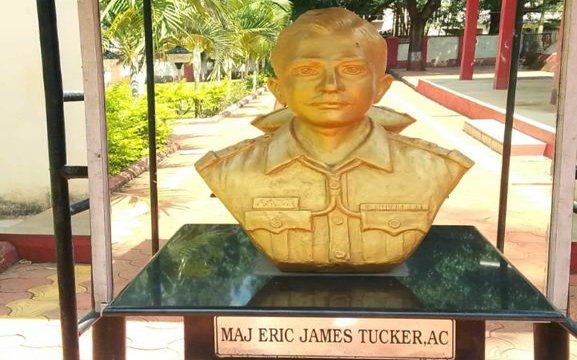Bhubaneswar: India has produced many bravehearts who have made supreme sacrifice for the motherland. Odisha is not far behind when it comes to producing such brave sons.
Captain Eric James Tucker was a young and handsome Army officer and the first Ashok Chakra awardee in Odisha. His saga of valour and supreme sacrifice is unparalleled as he died for the motherland fighting the Naga insurgents.
However, his is a forgotten lore as the state and the country have done little to honour the legend. Born in Cuttack, October 21, 1927, Captain Tucker studied in Stewart School before shifting to Koraput with his father who was in Odisha Police.
The school, which has produced many stalwarts including Netaji Subhash Chandra Bose, has a rich history of education. The 138-year old institution was instrumental in shaping the formative years of Tucker.
PV Narsayyah , a former Stewartonian, said Captain Tucker was awarded the Ashok Chakra, the highest gallantry award posthumously by the President of India January 26, 1958.
As an ex-student of the school, he said, he is sad that people have forgotten the supreme sacrifice of Tucker. Captain Tucker served in the 2nd Battalion of the Maratha Light Infantry.
When the unit was contacted, the details of late Captain’s son Yashwant Tucker were traced.
Yashwant, a former Air India employee leading a retired life in Mumbai, was contacted and a new story unfolded that Captain Tucker had his roots in Odisha. Yashwant said he was only 11 months old when his father attained martyrdom.
This he had heard from his mother and grandmother. He mentioned that the Indian Army and the 2nd Maratha Light Infantry have always kept in touch with him.
However he has not heard anything from his father’s school or the state of Odisha till date. Now after Narasayya remembered his senior, Stewart School, Cuttack is conducting a special assembly to honour the braveheart on his birthday October 21, 2021.
Captain Eric Tucker was assigned the task of opening the lines of communication from Chakabama to Phek during the Nagaland uprising in 1957 and destroy the hostile concentrations en route to establish a post at Meluri.
This task was achieved October 9, 1956.
Employing feats of skill in clearing varied obstacles on the road, showing great leadership in crossing turbulent Tizu river, neutralising hostile resistance opposing the advance with courage and determination, infusing great confidence on the troops under his command, Captain Tucker achieved this task in nine days.
Captain Tucker was to move from Khusami to Kirikhu, August 2, 1957. Hostile elements, who had obtained prior information of his move, laid an ambush from the thick undergrowth. Captain Tucker was hit in his face and leg.
However, he stood his ground and engaged the enemies with his stengun and firing from the hip until his magazine was empty. He charged towards the enemies with a grenade.
However, a further burst of automatic fire hit him in his chest and he collapsed and attained martyrdom.
PNN






































